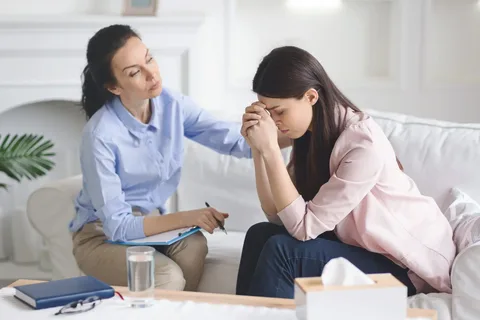Do you suffer from anxiety? Are you looking for an effective way to manage your symptoms? Look no further! This blog post will unveil a comprehensive guide to anxiety treatment in Sydney. With detailed information on various forms of therapy, medications, and lifestyle changes, you’ll find everything you need to know about managing your anxiety and leading a healthier life. So if you’re looking for tips, advice, and guidance on anxiety treatment Sydney, keep reading!
Understanding Anxiety
Anxiety is a common mental health condition affecting millions of people worldwide. It is characterized by fear, worry, and unease that can interfere with daily life. Understanding anxiety is crucial to manage and treat it effectively.
Anxiety can manifest in various forms, such as generalized anxiety disorder (GAD), panic disorder, social anxiety disorder, and phobias. Genetic, environmental, and psychological factors can cause it. Common anxiety symptoms include restlessness, irritability, difficulty concentrating, muscle tension, and sleep disturbances.
It’s essential to recognize that occasional anxiety is normal and can be a response to stress or particular situations. However, when anxiety becomes persistent and begins interfering with daily functioning, it may be a sign of an anxiety disorder requiring treatment.
By understanding anxiety, individuals can gain insight into their condition and take proactive steps towards managing it. This includes learning about triggers and stressors, identifying negative thought patterns, and practicing relaxation techniques. Educating oneself about anxiety can also help reduce mental health stigma and encourage seeking support and treatment.
Support Systems for Anxiety Treatment
Anxiety can be a debilitating condition that requires a support system to help you cope. Whether it be family, friends, or a support group, having a network of people who understand and support you is crucial in managing your anxiety.
Support systems can offer a range of benefits, such as emotional support, encouragement, practical help, and a sense of belonging. Talking to someone who understands what you are going through can provide a sense of relief and make you feel less isolated. Support groups are an excellent option for people struggling with anxiety as they can connect with others who share similar experiences and provide a space to discuss coping strategies and receive guidance from peers.
Friends and family can also be an excellent source of support for those experiencing anxiety. They can offer emotional support and be there to listen when you need to vent. It is essential to educate your loved ones about anxiety and help them understand your symptoms, triggers and how to support you best.
Tips for Self-Help and Coping Strategies
When managing anxiety, self-help and coping strategies are crucial in improving overall well-being. Here are some tips that can help individuals take control of their anxiety:
- Identify triggers: Pay attention to situations or events that tend to increase your anxiety levels. By identifying these triggers, you can prepare yourself mentally and develop strategies to cope effectively.
- Practice deep breathing: Deep breathing exercises can be incredibly beneficial in calming the mind and reducing anxiety. Take slow, deep breaths in through your nose, hold for a few seconds, and then exhale slowly through your mouth.
- Stay active: Engaging in physical activity regularly can have a positive impact on your mental health. Exercise releases endorphins, which are known to improve mood and reduce anxiety.
- Challenge negative thoughts: Replace negative thoughts with positive and rational ones. Remember that anxiety does not define you, and your fears are often exaggerated.
- Practice mindfulness: Mindfulness focuses on the present moment without judgment. This can be achieved through meditation, deep breathing exercises, or simply engaging in activities that bring you joy.
- Maintain a healthy lifestyle: Ensure you get enough sleep, eat a balanced diet, and limit caffeine and alcohol intake. These lifestyle factors can significantly influence anxiety levels.

The Importance of Seeking Professional Help
Anxiety can be debilitating and impact all areas of a person’s life. While self-help strategies can be beneficial, seeking professional help is essential for effectively managing anxiety. Professional help can provide individuals with the necessary tools and resources to better cope with their symptoms.
Therapy can help individuals identify triggers and behaviour patterns that may contribute to their anxiety. Through talk therapy, cognitive-behavioural therapy, and other therapeutic approaches, individuals can learn new coping mechanisms, reduce stress levels, and improve their overall quality of life.
Additionally, medication may be necessary for some individuals with anxiety disorders. A licensed mental health professional can determine if medication is needed and prescribe appropriate medication to manage symptoms.
It’s essential to seek professional help sooner rather than later, as untreated anxiety can lead to more severe symptoms and impact daily functioning. With the guidance of a mental health professional, individuals can develop effective strategies for managing their anxiety and lead fulfilling lives.
Traditional Methods for Anxiety Treatment Sydney
When it comes to traditional methods for anxiety treatment Sydney, several options are available. These methods often involve a combination of therapy and medication, and they have been proven effective in helping many people manage their symptoms and live fuller, happier lives.
One common type of therapy for anxiety is cognitive-behavioural therapy (CBT). This type of therapy helps patients identify negative thought patterns and behaviours contributing to their anxiety and teaches them techniques for replacing those patterns with healthier ones. CBT is effective for many anxiety disorders, including generalized anxiety disorder, panic disorder, and social anxiety disorder.
In addition to therapy, many people with anxiety benefit from medication. Several different types of medications may be prescribed for anxiety, including selective serotonin reuptake inhibitors (SSRIs) and benzodiazepines. SSRIs are typically used as a first-line treatment for anxiety, as they are generally well-tolerated and are effective for many people. Benzodiazepines, on the other hand, are usually used on a short-term basis to help alleviate acute symptoms of anxiety, such as panic attacks.
Alternative Anxiety Treatment Options
While traditional methods for anxiety treatment in Sydney are effective for many individuals, alternative treatment options can also provide relief for those experiencing anxiety. These alternative approaches focus on holistic methods that address the mind, body, and spirit.
One popular alternative treatment option is acupuncture. This ancient Chinese practice involves inserting thin needles into specific points on the body to promote the flow of energy and restore balance. Many individuals have reported a reduction in anxiety symptoms after undergoing acupuncture sessions.
Another alternative treatment option is mindfulness meditation. This practice involves focusing on the present moment and accepting one’s thoughts and feelings without judgment. Mindfulness meditation has been shown to reduce anxiety by promoting relaxation and stress reduction.
Aromatherapy is another alternative treatment option that can help alleviate anxiety symptoms. Certain essential oils, such as lavender and chamomile, have calming properties and can be used in diffusers or applied topically to promote relaxation and reduce anxiety.
Other alternative treatments for anxiety include yoga, massage therapy, and herbal remedies. Yoga combines physical movement with deep breathing and meditation, providing a holistic approach to managing anxiety. Massage therapy helps to release tension in the body and promote relaxation. Specific herbal remedies, such as valerian root and passionflower, have been used for centuries to reduce anxiety symptoms.
Lifestyle Changes for Managing Anxiety
Making specific lifestyle changes can significantly assist in managing anxiety symptoms and promoting overall mental well-being. Here are some effective strategies to consider:
- Regular Exercise: Engaging in physical activities releases endorphins known to boost mood and reduce anxiety. Aim for at least 30 minutes of moderate exercise daily, such as jogging, walking, or yoga.
- Balanced Diet: Consuming a nutritious diet plays a significant role in maintaining optimal mental health. Add whole grains, fruits, vegetables, lean proteins, and omega-3 fatty acids to your meals. Avoid excessive caffeine, sugar, and processed foods, as they can exacerbate anxiety symptoms.
- Sufficient Sleep: Prioritize getting enough sleep each night, as sleep deprivation can worsen anxiety. Establish a consistent sleep schedule, create a relaxing bedtime routine, and ensure your sleep environment is calm and comfortable.
- Stress Management Techniques: Explore different stress-reducing techniques that work for you, such as deep breathing exercises, mindfulness meditation, journaling, or engaging in hobbies that bring you joy.
- Limit Alcohol and Substance Use: While it may seem tempting to turn to alcohol or substances to alleviate anxiety temporarily, they can exacerbate symptoms in the long run. Limit or avoid their use altogether.
- Social Support: Surround yourself with a supportive network of family and friends. Sharing your thoughts and feelings with trusted individuals can provide comfort, perspective, and validation.
Conclusion
In conclusion, anxiety is a common mental health issue affecting millions worldwide, and seeking treatment is crucial for managing and overcoming it. While there is no one-size-fits-all approach to anxiety treatment, various options in Sydney can help individuals find relief and live a more fulfilling life.
Support systems like friends, family, and support groups are crucial in treating anxiety. They provide a safe space to share experiences and offer emotional support. Additionally, self-help techniques and coping strategies, such as practicing mindfulness and engaging in relaxation exercises, can be beneficial in managing anxiety on a day-to-day basis.
However, it is crucial to recognize that professional help is essential for those struggling with severe anxiety or individuals not experiencing relief from self-help techniques. Trained therapists and psychiatrists in Sydney can provide evidence-based therapies and medications tailored to individual needs.
Traditional methods, such as cognitive-behavioural therapy (CBT) and medication, have proven effective in treating anxiety. However, alternative treatments, such as acupuncture and herbal supplements, can also be considered adjunct therapies for those who prefer a more holistic approach.
| Other Good Articles to Read |
| Blogs-Nation |
| Blogs-Peoples |
| Bryan Smith Blogs |
| Intellect Blogs |
| The Fault In Our Blogs |
| Blogs Eu |
| Oz Forums |
| Recruitment Blogs |
| Zet Blogs |
| Blogs Tudiolegale |
| Blogs Map |

